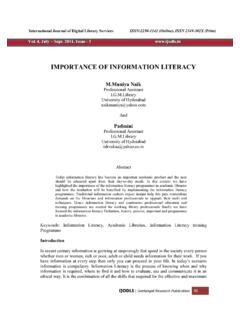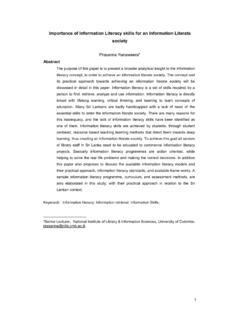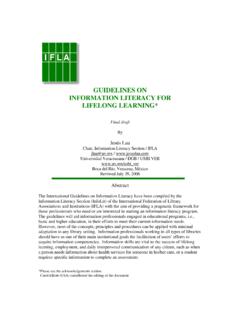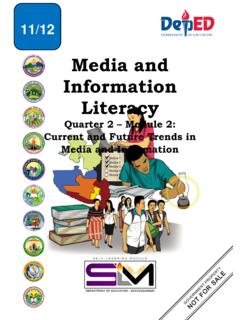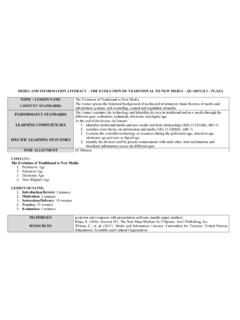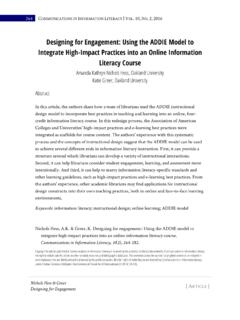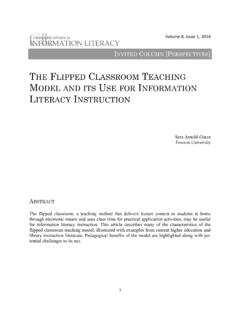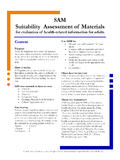Transcription of Information Literacy Concepts - East Carolina University
1 Information Literacy ConceptsAn Open Educational Resource 2017 Joyner Library, Literacy Concepts : An Open Educational Resourceby David Hisle and Katy WebbAttribution-NonCommercial-ShareAlike International (CC BY-NC-SA )A fully editable copy of this resource is available under the above license at: 2 Information Literacy ConceptsAn Open Educational Resourceby David Hisle and Katy WebbINFORMATION Literacy CONCEPTS3 Table of ContentsIntroduction: What is Information Literacy ?CHAPTER ONE: How Libraries WorkCHAPTER TWO: What s Credible Anymore? Fake News and evaluating the Information you encounter during your researchCHAPTER THREE: The Information Landscape: an Overview of Information types and when they appear in publicationCHAPTER FOUR: Navigating the Information Landscape: Search Engines, Library Databases, Library of Congress Classification, and Discovery ToolsCHAPTER FIVE: The Research Process: Settling on a topic, identifying key-words, and retrieving the Information you needCHAPTER SIX: The Ethical Use of Information : About academic integrity, avoiding plagiarism, and scholarship as a conversationGLOSSARY4 INTRODUCTION: What is Information Literacy ?
2 What is Information Literacy and what does it mean to be Information literate? The American Library Association defines Information Literacy as a set of abilities empowering individuals to recognize when Information is needed and to be able to locate it, evaluate it, and use it effectively. While Information Literacy is often talked about on college campuses in terms of doing library research for papers and annotated bibliographies and other sorts of classroom assignments, we use and need Information in every aspect of our about all of the informal research we do each day. We look up movie and book reviews, how-to videos on YouTube, product reviews, and strategies for parenting. We Google how to fill out some field on our tax forms, we look up job ads and tips on job interviews, how to spell or Information Literacy CONCEPTS5define some unfamiliar word or acronym.
3 We all have in-formation needs, and being able to effectively identify and meet those needs is at the core Information Literacy . Being able to differentiate quality Information from questionable Information is also critical. Is that shocking article your sister posted on social media actually true? What about health advice offered by a friend? What about some surprising statistic you heard cited by a politician or political candidate?The American Library Association asks to think about Information Literacy in six Authority Is Constructed and ContextualWhen you use Information , or choose one source of in-formation over another, you presume a certain amount of expertise on the part of the Information s author on the topic they are writing about. What gives the author that authority? What makes some Information more authoritative than other Information ? What makes a piece of Information authorita-tive can vary from discipline to discipline and be based on context.
4 So for example, an author may be an authority on a given topic because of extensive experience, or because of extensive education. Even without deep experience or education, an author may bring authority to their writing based on their having witnessed or participated in some major event. In both cases, their authority is contextual. A physics professor may have authority when writing within their field, but be considered far less authoritative when writing in an unrelated Information Creation as a ProcessInformation appears in a variety of forms. Depending on whether it is in the form of a newspaper article, a scholarly book, or a formatted report, the creation of Information requires a process. Understanding how and why authors publish in a particular format, what those formats require in terms of fact checking, or sourcing, or expertise, what editorial oversight exists, the role of publishers all these considerations may play into your thinking about the rel-evance of a particular Information source to your research question.
5 3. Information Has ValueInformation has value, and this fact has very real implica-tions to researchers and Information consumers in both how Information is produced and how it is disseminated. It has economic value as a commodity, for example, as evidenced by intellectual property rights and other legal considerations, and by the considerable role of the publishing industry. Information also has educational and social value, with its ability to inform, educate, and Research as InquiryOne can think of research as an inquiry. A researcher asks a question, or identifies some gap in our current under-standing of a topic, and in the process of filling that gap, new questions and new avenues for further research emerge. Information Literacy CONCEPTS75. Scholarship as ConversationScholarship on a given topic will grow and evolve over time. New theories, new interpretations, new experiments, new facts are always being discovered and debated.
6 As the references or citations of any scholarly article demonstrate, every researcher is building on the work of many other re-searchers. Conscientious scholars will always go to great effort to indicate what previous work has informed their own work. College students are expected to adopt this practice as well, citing the work that informs their own work and situat-ing their ideas and theories within the larger conversation taking place in their respective Searching as Strategic ExplorationOver time, as you gain experience and your research needs grow more complex, you will likely develop sophisticated strategies for locating relevant Information . Searching for Information is rarely as simple as just plugging a keyword into a search engine or library database and getting all the books and articles you need. You ll likely try different ways of searching for Information , and in different places.
7 You may want to brainstorm, or talk to a librarian. The five chapters in this text each look at a different aspect of Information Literacy but will collectively provide you with an overview of those Concepts most critical to navigating today s Information environment. After each chapter you will have the opportunity to test your understanding with a brief reflection. We begin by looking at the research ONE:How Libraries WorkWe can always benefit from knowing a little more about how our campus libraries operate. Understanding the dif-ferent roles the library and librarians play on your campus can help us to ask better informed questions and go deeper in our search for relevant and high quality Information . Campus libraries are always changing to accommodate new technologies and the evolving needs of the students and faculty who use them, but the core functions of libraries remain mostly ServicesAccess Services is a major department in any library, though it will sometimes be called the circulation depart-ment.
8 Access Services provides students with the means to Information Literacy CONCEPTS9access a library s collections, meaning that they check books in and out and maintain borrower records. These borrower records, or library accounts, are usually only available to access services staff. In other words, if we have any ques-tions about our library account, or want to check books in or out, or want to pay or contest a fine, Access Services is who can help. Access Services may have other services as well. Course reserves are usually kept here, as is the technology (cameras, microphones, laptops, etc.) that your library may loan librarians assist students with locating relevant Information for their projects. They can also (often) track down answers to especially challenging questions. Your library s reference department will probably have a service desk where you can ask question and talk to librarians.
9 At some libraries, the reference desk is combined with access offering one-on-one assistance with research, reference librarians may also teach library instruction classes on your campus. If you are uncertain about the best places to look for Information on a given topic, ask a reference librarian. Typically academic libraries will have librarians with specialized areas of expertise, so expect your library to have a business librarian, a STEM librarian, and so CollectionsMost large libraries will maintain special collections. These collections may be based on particular themes, often 10with a focus on local history. Special collections are often comprised of primary documents. These primary sources may be letters or old photographs, drafts of a poet s works, or the correspondence of a notable scholar or and Discovery ServicesTechnical services largely refers to acquisitions and cata-loging, with the former purchasing books and journals for the library and the latter integrating them into the collection.
10 You will rarely see these librarians, as they typically have no public service role, but they make up a big part of staff in any large library. The search (discovery) tools themselves also require time and staff to develop and maintain, so your library will also have staff devoted to operating and improving the library catalog interface and whatever other local discovery tools are available for You Can ExpectYour library may have a print collection with thousands or even millions of volumes--it may provide you with instant access to millions of electronic articles and books. But no library owns every title. You may need some seminal work on your topic--or perhaps just the next book in a series you are reading for pleasure--that is not part of your local library s collection. This does not mean that the item is unavailable to you. Expect your library to have an interlibrary loan service to help fill in the inevitable gaps in its loan services borrow the materials we need from other libraries and make them available to us.
